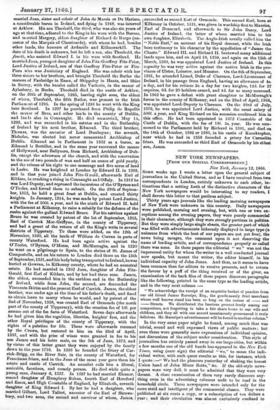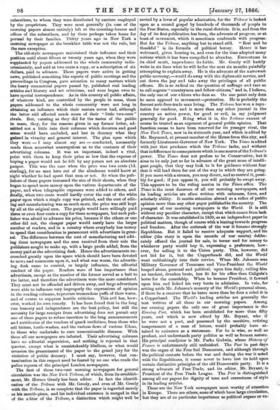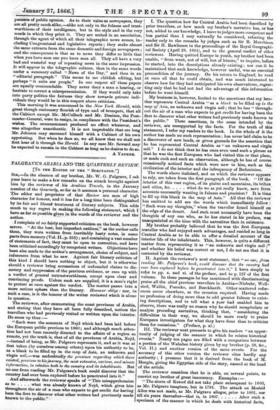NEW YORK NEWSPAPERS.
[FROM OUR SPECIAL CORRESPONDENT.]
New York, January 12, 1866. SOME weeks ago I wrote a letter upon the general subject of journalism in the United States, and as I have received from two correspondents in London, entirely unknown to each other, in- timations that a setting forth of the distinctive characters of the New York newspapers would be interesting to my readers, I shall devote this letter to that perilous subject.
Thirty years ago journals like the leading morning newspapers of New York were unknown in this country. Daily newspapers were published, morning and evening, but, with one or two ex- ceptions among the evening papers, they were purely commercial in their character, although they were strongly partizan in politics. But they were simply large single sheets, the greater part of which was filled with advertisements hideously displayed in large type (a nuisance from which the best of our papers are not yet free), the news being meagre, the comment upon it not deserving the name of leading article, and of correspondence properly so called there was none. In these papers the editorial " we" was not the impersonal entity for whom the writer in a well conducted journal now speaks, but meant the writer, the editor himself, in his individual capacity of John Jones. And thus, as it seems to have been common then for editors to receive presents, and to return the favour by a puff of the thing received or of the giver, an examination of the back files of these papers discovers paragraphs like the following, printed in the same type as the leading article, and in the very next column :-
" We acknowledge the receipt of an exquisite basket of peaches from our old friend James Rareripe, Esq., the gentlemanly fruit merchant whose well known stand has been so long on the corner of — and — Streets. We distributed the luscious present freely among our compositors, not forgetting to take a fair share home to our wife and children, and they all with one accord unanimously pronounced it truly delicious. Mr. Rareripe's advertisement will be found in another column."
In the very same paper might be found, among much that was trivial, sound and well expressed views of public matters ; but even these were generally mere expressions of individual opinion, not discussions of the subject under consideration. This style of journalism has entirely passed away in our large cities, but within a few months one of the old hands has appeared in the New York limes, using (sure sign) the editorial " we," to mean the indi- vidual writer, with such queer results as this, for instance, which I quote :—" We had the pleasure yesterday of shaking the honest Union hand of John Minor Botts," &c. If the old-style news- papers were very dull, it must be admitted that they were very decent. A close examination of them very rarely discovers any- thing even in the advertising columns unfit to be read in the household circle. These newspapers were intended only for the more staid and intelligent of the commercial classes. They were published at six cents a copy, or a subscription of ten dollars a year ; and their circulation was almost exclusively confined to subscribers, to whom they were distributed by carriers employed by the proprietors. They were most generally (in case of the morning papers almost entirely) left at the counting-houses and offices of the subscribers, and by them perhaps taken home for perusal by their families. Thirty years ago in New York a morning newspaper at the breakfast table was not the rule, but the rare exoeption.
The old-style newspapers maintained their influence and their position until about fifteen or twenty years ago, when they were supplanted by papers addressed to the whole community indis- criminately, and sold at two cents a copy, or a subscription of six dollars, paid in advance. These papers were active in getting news, published something like reports of public meetings and the proceedings in Congress, gave attention to many matters which the heavy commercial papers passed by, published real leading articles and literary and art criticisms, and soon began even to have special correspondence. As in this country all public affairs, of whatever kind, are controlled by the people in mass, these papers addressed to the whole community were not long in obtaining an influence which their seniors never had, although the latter still affected much scorn of their " little two-cent " rivals. But, catering as they did for the tastes of the public in mass, they, for the reasons given in my former letter, ad- mitted not a little into their columns which decorum and good sense would have excluded, and lost in decency what they gelded in vivacity and general interest. The plan upon which they were — I may almost say are — conducted, necessarily made them somewhat unscrupulous as to the contents of their advertising columns. It was an important, indeed a vital, point with them to keep their price so low that the expense of buying a paper would not be felt by any person not an absolute pauper. This was the case when the price was two cents (1d. sterling), for no man here out of the almshouse would know at night whether he had spent that sum or not. So when the pub- lishers of these papers increased the size of their sheets, when they began to spend more money upon the various departments of the paper, and when telegraphic expenses were added to others, and finally, when two cents would hardly cover the cost of the white paper upon which a single copy was printed, and the cost of edit- ing and manufacturing was as much more, the price was still kept by all at the original sum. The people would have willingly paid three or even four cents a copy for these newspapers, but each pub- lisher was afraid to advance his price, because if the others or one other did not, the cheaper paper would surely have the larger number of readers, and in a country where everybody has money to spend that consideration is paramount with advertisers in gene- ral. The difference between the coat of manufacturing and edit- ing these newspapers and the sum received from their sale the publishers sought to make up, with a large profit added, from the money paid at the advertising desk. Hence the advertisements en- croached greatly upon the space which should have been devoted to news and comments upon it, and what was worse, the advertis- ing desk came to .control, or largely influence, the editorial conduct of the paper. Readers were of less importance than advertisers, except as the number of the former served as a bait to the latter, and therefore the advertisers were the more considered. They must not be offended and driven away, and large advertisers were able to influence very improperly the expressions of opinion in the reading columns, toprocure tremendous puffs of their wares, and of course to suppress hostile criticism. This evil has, ho w- ever, worked its own remedy. It has been found that in the long run honesty and independence are the best policy, but still the necessity for large receipts from advertising does not permit. any one of these papers to refuse insertion to the long announcements and certificates of the vendors of quack medicines, from those who sell bitters, tooth-washes, and the various dews of various Edens, to those who undertake to care unmentionable diseases. With these all our newspapers are infested. Their advertising columns have no editorial supervision, and -nothing is rejected in that quarter, except what is unmistakeably libellous, or what would occasion the presentment of the paper to the grand jury for the violation of public decency. I must say, however, that con- tamination in this respect need be feared by no one who reads the police reports of the principal London newspapers.
The first of these two-cent morning newspapers for general circulation was the New York Tribune, of which, from its establish- ment, Mr. Horace Greely has been editor. In fact the identifi- cation of the Tribune with Mr. Greely, and even of Mr. Greely with the Tribune, is so complete that the paper is regarded merely as his mouth-piece, and his individual existence is merged in that of the elitOr of the Tribune, a distinction which might well be envied by a lover of popular admiration, for the Tribune is looked upon as a second gospel by hundreds of thousands of people in the Free States, especially in the rural districts. It is, and from the day of its first publication has been, the advocate of progress, or at least of movement, which it sometimes confounds with progress. But for the Tribune, anything but to stand still. " Rest and be thankful" is its formula of political heresy. Hence it has welcomed, given hearing to, and even for the time adopted many notions which it has been compelled to abandon. Earnestness is its chief merit, imprudence its foible. Mr. Greely will hastily write in six lines what he will be for the next six months painfully attempting to explain away. He is the advocate of the narrowest public economy,—would do away with the diplomatic service, and cut down the pay and take away the privileges of all public officers. He is so radical on the question of suffrage and race as to call negroes " countrymen and fellow-citizens," and is, I believe, the only one of our editors who does so. On one point only does he seem opposed to movement--protection. He is probably the fiercest anti-free-trade man living. The Tribune has won a repu- tation for candour, and is more than any other journal in the country an active power, for good or evil, in my judgment generally for good. Being what it is, the T ribune cannot of course be trusted as an exponent of general public opinion. That function seems to have been reserved for its younger rival, the New York Times, now in its sixteenth year, and which is edited by Mr. Raymond, at present member of the House from this city, and formerly Lieutenant-Governor of New York. The limes is edited with just that prudence which the -Tribune lacks, and without that indifference to consequences which is one source of the 7 ribune's power. The Times does not profess to be Conservative, but it aims to be only just so far in advance of the great mass of intelli- gent people, that they may look to it for guidance without fear that it will lead them far out of the way in which they are going. If you move with a stream, you may divert, and so control it, possi- bly for good; if you oppose it, you will probably be swept away. This appears to be the ruling maxim in the Times office. The Times is the moat decorous of all our morning newspapers, and its leading articles are often written with calmness, force, and scholarly ability. It merits attention abroad as a reflex of public opinion more than any other paper publishedin the country. The youngest of -our morning newspapers is the World. It is still without any peculiar character, except that which comes from lack of character. It was established in 1859, as an independent paper in political matters, though of course with a leaning towards progress. and freedom. After the outbreak of the war it became strongly Republican. But it failed to receive adequate support, and its editor (the story is upon the records of our courts) delibe- rately offered the journal for sale, in terms and for money to whichever party would buy it, expressing a preference, how- ever, for selling it to the Union party. This, however, did not bid for it, but the Copperheads did, and the World went unblushingly into their service. When Mr. Johnson was Military Governor of Tennessee and Vice-President the World heaped abuse, personal and political, upon him daily, calling him an insolent, drunken brute, less fit for his office•than Caligula's horse for the consulship. When he became President, it fawned upon him and licked his very boots in adulation. In vain, for setting aside Mr. Johnson's memory of the World's personal abuse, if there be a creature that he hates more than he does a rebel it is a Copperhead. The World's leading articles are generally the best written of all those in our morning papers. Among our evening papers the only one of great importance is the Evening Post, which has been established for more than fifty years, and which is now edited by Mr. Bryant, who if he were not a poet, and possessed by the sensitive, retiring temperament of a man of letters, would probably have at- tained to eminence as a statesman. For he is wise, as well as prudent, and understands party politics as well as human nature. His principal coadjutor is Mr. Parke Godwin, whose History of France is unfortunately still unfinished. The Post in past days was the organ of the Free Soil Democrats, and although through the political contests before the war and during the war it acted with the Republicans, it seems never to have lost its hold upon certain distinctive principles of the old Democratic party. It is a strong advocate of Free Trade, and its editor, Mr. Bryant, is President of the Free Trade League. The Post is distinguished among all our papers for dignity of tone and correctness of style in its leading articles.
These are the New York newspapers most worthy of attention in Europe. There are others, some of which have large circulation, but they are of no particular importance as political organs or ex- poneats of public opinion. As to their value as newspapers, they are all pretty much alike,—alike not only in the fulness and trust- worthiness of their intelligence, but in the style and in the very words in which they print it. They are united in an association, through the agent of which all their telegraphic news eomes, in- cluding Congressional and legislative reports ; they make almost the same extracts from the same domestic and foreign newspapers ; and the consequence is that as to news they differ so little that when you have seen one you have seen all. They all have a very bad and wasteful way of repeating news in the same impression. It will appear in the telegraphic column, then in the same words under a summary called " News of the Day," and then in an " editorial paragraph." This seems to me childish editing, but perhaps "it suits our people." In one respect all these papers are equally commendable. They never deny a man a hearing, or hesitate to correct a misrepresentation. If they would only take into party politics the fairness they show towards private indi- viduals they would be in this respect above criticism.
This morning it was announced in the New York Herald, with great though customary flourish of type and of trumpets, that all the Cabinet except Mr. McCulloch and Mr. Denison, the Post- master-General, were to resign, in compliance with the President's wishes. The announcement produced no effect whatever, and was altogether unauthentic. It is not improbable that ere long Mr. Johnson may surround himself with a Cabinet of his own appointing. But when he does so, we all know that we shall not first hear of it through the Herald. In any case Mr. Seward may be expected to remain in the Cabinet as long as he desires to do so.
A YANKEE.




































 Previous page
Previous page